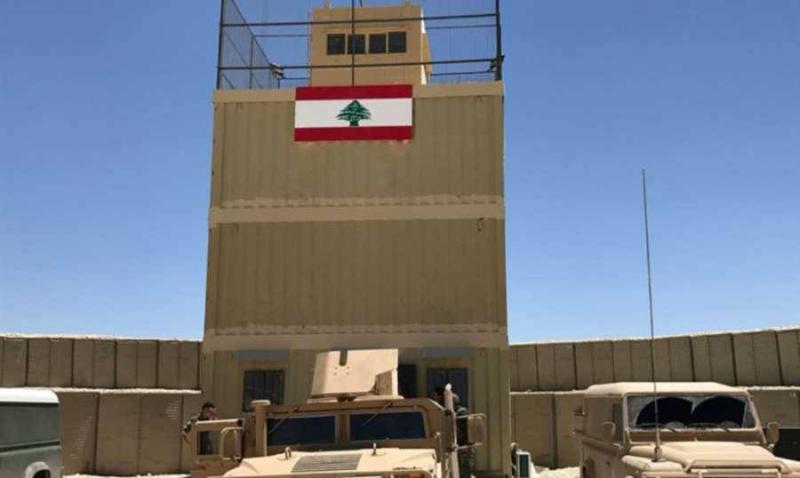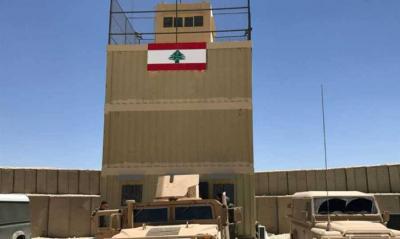After years of monitoring American and British activities along the Lebanese-Syrian border, the Syrian government has decided to send an official memorandum to the Lebanese government regarding the towers established along the border, from the mouth of the river al-Kabir in the north to beyond the Rashaya area in Baalbek.
The memorandum, which arrived from the Syrian Foreign Ministry to its Lebanese counterpart earlier this week, contains a serious declaration deeming the towers set up by the British for the four land border regiments of the Lebanese army along the Syrian border as a "threat to Syrian national security." The memorandum details the threat on several levels, the first being the sensitive reconnaissance and espionage equipment included in the tower systems, which can illuminate deep into Syrian territory and gather intelligence on the internal situation in Syria.
According to the Syrian message, the intelligence gathered from this equipment reaches the British, and the Israeli enemy benefits from this information to target Syrian territory and carry out strikes within Syria. The memorandum also mentions the presence of some British officers at the towers, during a time when the British have been taking a negative stance towards Damascus, participating with Americans and other Western forces in their war against Syria since 2011.
In its second part, the Syrian memorandum reminds that international law concerning shared borders between states obliges the first state—Lebanon—to provide the second state with the intelligence output from the observation towers it establishes on the second state's borders, provided that there is no war between the two states. If there is war, both countries have the right to establish opposite towers at zero distance from each side of the border. The memorandum concludes by requesting the Lebanese government to clarify and take necessary measures to protect joint security.
While sources from the Syrian embassy in Beirut refused to comment on the memorandum, neither confirming nor denying its dispatch, sources in the Lebanese Foreign Ministry confirmed to "Al-Akhbar" that they have received the Syrian message and sent copies to Prime Minister Naji Abi Assi, the military leadership, and the relevant authorities in the state, but they declined to comment on its contents, stating that they would respond to the Syrian message once the official position is established.
This Syrian letter arrives at a crucial political and security juncture and divides direct impact into two parts. The first relates to the towers on the eastern and northern borders. The second concerns the proposed British project for the southern border with occupied Palestine, officially raised by British Foreign Minister David Cameron during a meeting with Army Commander General Joseph Aoun in his recent visit to Beirut earlier this month.
While the military's Directorate of Guidance postponed answering "Al-Akhbar's" questions pending further study of the issue, sources close to the British embassy said that the embassy is proud of the continuous British support for the Lebanese army and the land border regiments that have helped secure protection for the Lebanese-Syrian border. Through the observation towers, the army has been able to identify and prevent activities including smuggling, without commenting on the contents of the message.
Awaiting official clarifications regarding the severity of what the message mentioned about the towers' role in threatening Syria, this signal from Damascus is the first of its kind after a very cautious policy in dealing with the Lebanese state, since the start of diplomatic representation between the two countries in 2009, even during the height of the Syrian war. The bias of many governments towards the camp opposing Damascus and the threat to Syrian territory from Lebanon through arms and militants smuggling and conducting attacks from Lebanese territory, and the onset of tower constructions since 2012, had not prompted the Syrians to act until now, to demand the mitigation of the threat and the right to obtain the intelligence output.
According to "Al-Akhbar" information, there are discussions about ideas to establish new towers that enhance control over the area extending from north to south of the Al-Masnaa area, reaching Mount Hermon, akin to the dense towers built from the sea to Arsal, coinciding with the British proposal for the southern border. This could be a reason pushing the Syrians to mobilize against what they consider a danger for years.
In addition to repeated strikes on deep Syrian territory by the Israeli enemy, often using Lebanese territory, the deterioration in Syrian-British relations and the British stance and behavior towards the Syrian government are additional reasons for the Syrians to be vigilant regarding British activities along the Lebanese border.
The British proposal for the southern Lebanese border with the establishment of towers coincides with London's continued support for the Israeli enemy with weapons and ammunition and the training of some Israeli soldiers on British soil while providing Israel with information from reconnaissance aircraft, as well as executing assaults on Yemeni forces in defense of Israel. While American endorsement of the British proposal has not yet emerged, "Al-Akhbar" learned that there are British contacts with U.S. envoy Amos Hochstein to adopt this proposal as part of a package of proposals related to the southern borders.
The proposed project involves building towers that surveil five kilometers into Lebanese territory and five kilometers into occupied Palestinian territory, starting work in a small area, then expanding along the entire border. However, the British have no guarantees that Israel will agree to this proposal. On the contrary, Western diplomatic sources indicate that Israeli officials have scoffed at this proposal. Similarly, Lebanon has no guarantees of Israel complying with such a commitment, not to mention that resistance and the army are not inclined to give free gifts to the enemy.




